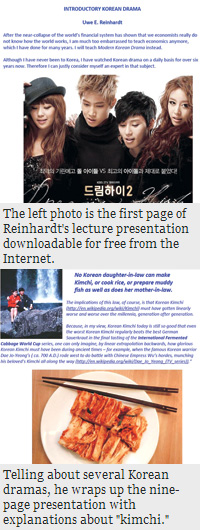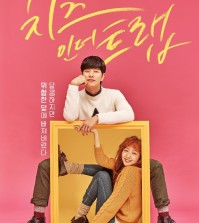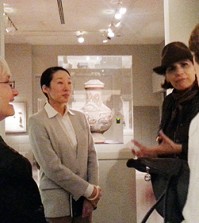- California Assembly OKs highest minimum wage in nation
- S. Korea unveils first graphic cigarette warnings
- US joins with South Korea, Japan in bid to deter North Korea
- LPGA golfer Chun In-gee finally back in action
- S. Korea won’t be top seed in final World Cup qualification round
- US men’s soccer misses 2nd straight Olympics
- US back on track in qualifying with 4-0 win over Guatemala
- High-intensity workout injuries spawn cottage industry
- CDC expands range of Zika mosquitoes into parts of Northeast
- Who knew? ‘The Walking Dead’ is helping families connect
Princeton professor’s take on K-Drama
Endings are often too “corny,” and the really bad characters are forgiven too easily
By Park Si-soo
A lecture presentation written in English popped up on Facebook several weeks ago, instantly taking Korean users of the social network website by surprise.
Why? It was all about Korean drama and, more importantly, written by prominent economics professor Uwe E. Reinhardt at Princeton University in New Jersey, United States.
So does this mean Korean drama has become a subject for academic study at the prestigious American school?
Titled “Introductory Korean Drama,” the nine-page presentation begins with Reinhardt offering a form of self-reproach about his limited ability to accurately anticipate change in the global economy.
“After the near-collapse of the world’s financial system has shown that we economists really do not know how the world works, I am much too embarrassed to teach economics anymore, which I have done for many years,” he wrote. “I will teach modern Korean drama instead.”
The 76-year-old scholar notes that he has never been to Korea but deserves to be called an “expert” on the subject because he has watched Korean dramas on a daily basis for more than six years. In fact, the clip well demonstrates the professor’s extensive knowledge of domestic TV drama, and highlights unique qualities that can only be observed in Korean dramas ㅡ often in a witty way.
“The immortal Korean Admiral Yi Sun Shin, who outsmarted Japanese Shogun Hideyoshi with his famous Chosun turtle ships, surely ranks as the most astute military strategist in all of human history,” he wrote. “But even the admiral would stand in awe before the strategic planning of a modern Korean-drama mother bent upon putting an end to her child’s undesired love affair.”
Reproducing the file on his Facebook account, Cho Jeon-hyeok, a lawmaker-turned-economics professor at Myongji University in Seoul, wrote on Jan. 31 that he feels tempted to stop teaching economics and follow in the footsteps of the American scholar.
In a recent email interview with The Korea Times, Reinhardt said the presentation in question was made not for teaching his students, but for an “impromptu lecture” he delivered in 2012 to “entertain” health insurance experts from Korea and Taiwan.
“Actually I do not teach such a course, but economics instead,” he said. “The lecture originated in a dinner held in Hualien, Taiwan, during a conference of Korean and Taiwan National Health Insurance.” The professor specializes in health care economics.
During the dinner, the scholar drank “soju,” a distilled alcoholic beverage native to Korea, with officials from the Korean National Health Insurance (KNHI), including a KNHI director who brought the soju over from Seoul.
“Because he (the director) knew of my fondness for Korean drama, he asked me during the dinner to give an impromptu lecture on Korean drama,” Reinhardt said. “The soju inside me emboldened me to get up and deliver the lecture, which later on I wrote up as a souvenir for everybody.”
The professor later shared the presentation with some Korean students at Princeton and one of them seems to have leaked it to Korean websites, he presumed.
“Sociologists and psychologists should study Korean dramas”
He usually watches Korean drama at home with his Chinese wife.
“As for my wife and me, we tend to work at nights and watch one episode of Korean drama during a break from work,” he said. “We like the dramas, because the more modern ones raise many moral issues arising out of the transition from the more traditional Confucian paradigm of Korea to the current, more modern Western inspired individualism. Although the plots sometimes can seem contrived, moral themes run throughout the dramas.”
He went on, “It’s a reasonable question to ask why Korean drama is so popular in China, Japan, Taiwan and many other parts of Asia. Sociologists and psychologists should study it.”
Listing dramas he has watched, most of them historical, including “The Immortal Admiral Yi Sun-shin,” “The Great King Gwanggaeto” and “Sejong,” he said they tell the story of an “impressive people” struggling against China and Japan to preserve Korean culture and the sovereignty of the nation.
“I find it to be a fascinating history that should be known more widely in the world,” he said.
The professor has high praise for Korean actors, estimating their abilities above those of Hollywood stars in some respects.
“They (Korean actors) can cry on command. Most Hollywood actors cannot do that,” he said. “They tend to play mainly themselves, and the movie scripts are adapted to them, (the exception is Meryl Streep). So my wife and I find Korean actresses and actors quite accomplished.”
Asked about the competitive edge of Korean dramas, Reinhardt said many of the dramas, even in contrived plots, portray problems and dilemmas that happen to people ㅡ especially to other Asian people still living with the Confucian ethic that puts family above the individual.
“I think the Korean stories resonate with them,” he said.
Wrapping up the interview, the long-time fan of Korean dramas made a brief suggestion to drama producers here.
“Often the endings of a drama series are let-downs. They seem hastily contrived and are often a bit corny (as we would put it). I think even I, an economist, could do better.”
He went on, “Furthermore, forgiveness of even the most egregious behavior seems to be a theme in Korean dramas. Sometimes one wishes that the really bad characters would be punished more. Is forgiveness of this sort really a reality in Korea?”

















Translate English to Spanish
August 12, 2017 at 1:37 AM
More About the Concept of an Afterlife: The only part of you that could in any way survive into an afterlife would have to be an immaterial part of you since when you snuff it, your material remains go nowhere. But any immaterial part of you would have no sensory apparatus so how could you enjoy an afterlife when you couldn’t experience it? On the other hand, if your life is but a computer simulation, then equally so could your afterlife be another simulation. One software program ends (death) and another begins (afterlife).